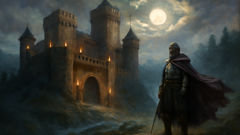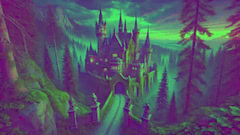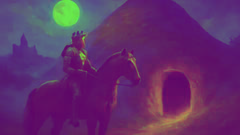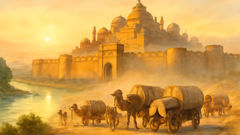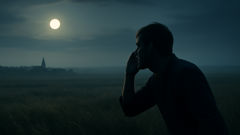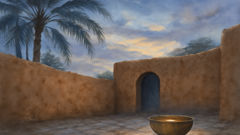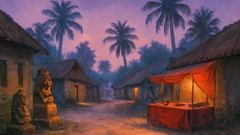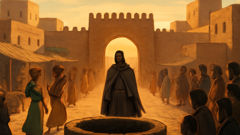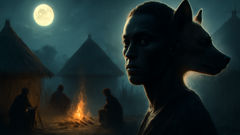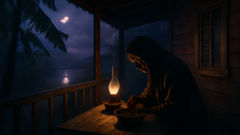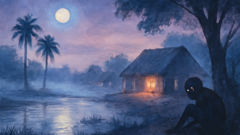Introduction
In the heart of Normandy, where rugged cliffs tumble into the wild surf and dense forests brood beneath gray skies, a chilling legend has haunted the land for centuries: the tale of Robert the Devil. His name alone sent shivers through castle halls and frightened prayers from peasant lips, for he was no ordinary knight. Whispers claimed he was conceived in desperation, the fruit of a fateful pact between his noble mother and the devil himself. Normandy, a patchwork of villages, meadows, and shadowy woods, became both cradle and crucible for a child whose very soul seemed marked by darkness. Robert’s childhood unfolded within the thick-walled keep of a proud but childless duke and his sorrowful wife. Their yearning for an heir had grown so deep that, one storm-lashed night, the duchess pleaded with unholy forces for a son, no matter the cost. When her wish was granted, joy soon curdled into dread. Robert was a beautiful, precocious child, yet strange portents swirled around him—unsettling fits of temper, animals cowering at his approach, and an unquenchable hunger for chaos. As he grew into a young man, those dark impulses sharpened into a ferocity that frightened even hardened knights. While his father trained him in chivalry and the arts of war, Robert’s sword seemed guided by a more savage will. Soon, tales of his merciless raids, his delight in torment, and his disregard for sacred law spread far beyond the duchy’s borders. Castles fell silent at his passing. The poor hid in root cellars, and even priests trembled at the rumors of blood that followed wherever he rode. Yet, beneath the armor and the rage, something restless flickered in Robert’s heart—a shadow of doubt, a longing to escape the infernal chains that bound him. The legend of Robert the Devil is not simply a chronicle of cruelty, but a journey through darkness toward a fragile hope. It is a story woven from the fears and faiths of a land where evil walked in the daylight, yet even the most accursed soul could find the narrow path to grace.
The Devil’s Bargain: A Child Born of Darkness
Normandy’s fields were ripe with wheat and wildflowers, but within the castle’s gray walls, the air was thick with sorrow. The Duke and Duchess of Normandy, for all their wealth and renown, remained childless year after year. The duchess prayed in every chapel, made offerings at every shrine, and even journeyed to distant abbeys, but her womb remained barren. Despair drove her to a desperate act one stormy evening, as thunder rattled the stained-glass windows and rain lashed the flagstones. Alone in her candlelit chamber, she whispered a vow to the shadows: she would accept a child, even if the cost was her soul. The air grew cold. The candle guttered. And in that moment, some unseen force seemed to settle in the room.
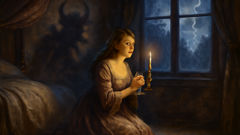
The duchess’s prayers were answered—though not in the way she hoped. She soon found herself with child, her face blooming with secret joy and dread. The duke rejoiced, and the entire duchy celebrated the coming heir. When Robert was born, his cries were piercing, his eyes impossibly dark. The midwife crossed herself and muttered prayers under her breath. Yet, to all outward appearances, Robert was a healthy, beautiful boy—so much so that the court marveled at him, as if the duchess had birthed a miracle.
But strange signs dogged his infancy. As a toddler, Robert shrieked at the sight of holy relics and raged against the gentle arms that sought to calm him. Animals skittered from his path; candles flickered and snuffed when he entered a room. The duchess, wracked by guilt and fear, concealed these incidents from her husband. She hoped love might conquer whatever darkness had entered her son’s blood. Yet as Robert grew, so too did the evidence of something unnatural.
At seven, he was caught driving a dagger into the hearth’s wooden beam, his face twisted with glee. Servants whispered of nightmares and broken sleep. The duchess, growing pale and thin, spent more time at confession. The duke, however, saw only the makings of a strong heir—his boy was wild, yes, but bold, unafraid, and clever beyond his years. So began Robert’s training in arms and horsemanship. Under the tutelage of grizzled knights, he proved himself a prodigy in battle. Yet, his victories tasted of bitterness. He showed no mercy in tournaments, humiliating his opponents. His laughter at their pain was sharp and cold. By adolescence, his presence on the practice field was enough to empty it.
The first true calamity struck during the feast of Saint Michael. The castle, festooned with banners and echoing with music, was hosting nobles from across Normandy. Amidst the revelry, a servant accidentally spilled wine on Robert’s cloak. In a flash, Robert seized the hapless youth and flung him down the stairs, his face alight with something primal. The duke was horrified by the violence, but the duchess’s fear cut deeper—she recognized the moment as confirmation of her worst secret. From then on, Robert’s rages grew fiercer, his cruelty more inventive. Some said he would not be sated until all Normandy bent before him in terror.
By his late teens, Robert was a knight, his sword blessed in the cathedral despite the trembling hands of the bishop. He led forays against neighboring lords, often exceeding his father’s orders. Villages burned in his wake; survivors told tales of a devil’s son, his banner blood-red in the dawn. His father’s scoldings could not tame him. Even the threat of excommunication left Robert unmoved, for he had begun to believe he was beyond all hope, fated to walk a path of destruction. The duchess, wracked with grief, withdrew from court life entirely, spending her days in ceaseless prayer and penance. Her love for her son warred against the horror of what he’d become.
Despite it all, there were rare moments when Robert’s eyes softened, when he’d ride alone into the forests and vanish for hours. No one knew what thoughts troubled him in those silent glades, but rumor held that even the crows would not follow him there. Normandy was caught between fear and fascination: their lord’s son was both their greatest hope and their deepest terror—a prince born of longing and dark bargains, whose fate was yet unwritten.
The Knight’s Reign of Terror
When Robert inherited his father’s command, Normandy braced for a new era—one that began not with celebration, but with whispered dread. The young duke’s banner, emblazoned with a black wolf on scarlet, became the sigil of fear. Robert’s army swelled with mercenaries and outcasts drawn by promises of plunder rather than fealty. Their boots trampled wheat fields into mud; their laughter echoed through pillaged villages. Peasant folk hid when they heard the thunder of hooves. Women clutched their children, and priests bolted church doors. The devil’s son had come into his own.
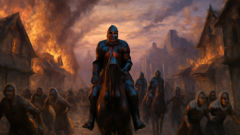
Robert ruled through terror and spectacle. He delighted in tournaments not as contests of skill, but as public humiliations. His armored figure—towering and unyielding—became a symbol of invincibility. Challengers who dared face him in the lists often left broken, their reputations in tatters. Yet it was in war that Robert’s legend truly grew dark. He led raids against rival lords with a ferocity that stunned even hardened veterans. Captured prisoners were offered mock trials before being thrown to starving hounds or strung up from the castle walls. Robert’s laughter rang loudest in the presence of suffering; his punishments were cruel innovations that became the subject of horrified stories across the countryside.
In one infamous campaign, Robert sacked the prosperous town of Évreux, a jewel among Norman cities. He rode through its gates at dawn, smoke and screams trailing in his wake. The town’s defenders fought bravely, but Robert’s tactics were ruthless—he ordered fires set to the granaries and churches, sparing neither child nor elder. Survivors described him as a demon in armor, his eyes glinting red in the reflected flames. The bishop of Évreux, a learned man, attempted to parley with him, hoping to appeal to whatever scraps of mercy lingered. Robert listened in silence, then ordered the bishop’s staff snapped before the altar and cast the man into chains.
Not even the sanctity of churches or abbeys offered refuge. Robert’s men looted sacred relics and violated holy ground, tearing gold from shrines and scattering monks. Rumors spread that he could not be harmed by ordinary weapons, that his mail was forged in hellfire. Songs once sung in his honor became dirges or grim warnings. Parents invoked his name to frighten unruly children; priests invoked it in exorcisms.
Yet beneath the black legend, Robert’s private torment grew. At night, when the revels ended and the castle’s halls grew still, he would stare into the hearth and recall fragments of his childhood—the warmth of his mother’s arms, her gentle prayers, now lost to him forever. Sometimes, he would ride out alone into the forest, haunted by memories and unanswerable questions. He saw visions in the shadows: his mother’s weeping face, the flicker of candlelight, a dark figure at her bedside. Guilt gnawed at him, but his pride and rage would not let him bend.
The final straw came during an especially harsh winter, when famine gripped the land. Robert’s tax collectors demanded tithes from starving peasants, and when they could pay no more, their homes were torched. One night, a group of desperate villagers stormed the castle gates, pleading for mercy. Robert ordered them driven back with arrows. As he watched their bodies fall in the snow, something within him finally broke. He felt no satisfaction—only a cold emptiness that no triumph could fill. The howling wind seemed to carry voices: his mother’s sobs, the cries of the dying, and a low, mocking laughter that chilled his soul.
That night, Robert could not sleep. He paced the battlements as snow drifted in swirling eddies. Looking down at his blood-stained hands, he realized that he had become everything the world had feared. The devil’s bargain had claimed him utterly. Yet, deep within, a spark remained—a longing for forgiveness, a sliver of hope that perhaps it was not too late to change.
The Road to Redemption: The Hermit’s Path
With winter deepening and his soul at its nadir, Robert vanished from his castle one frozen morning. His departure was so sudden that even his closest retainers were left baffled. Some claimed he had been spirited away by devils; others whispered that he’d fled under cover of darkness, unable to bear the weight of his own deeds. The truth was simpler—Robert rode alone into the forests, leaving behind armor, title, and all trappings of power.
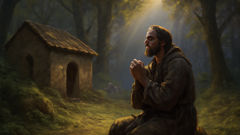
He wandered for days through tangled woods and snow-laden glades, sustained by little more than regret. The icy wind cut through his cloak; hunger gnawed at him; yet he pressed on, driven by an ache he could no longer ignore. At last, he reached a remote monastery perched on the edge of a wild moor. There he fell at the feet of the abbot, confessing his sins in a voice hoarse from exhaustion. The monks, recognizing the infamous knight, hesitated—yet the abbot, a gentle soul long-versed in the depths of human frailty, saw a flicker of sincerity in Robert’s despair.
He was given shelter in a stone cell and put to humble labor: hauling water from icy springs, tending the monks’ meager garden, repairing cloister walls battered by wind. For months, Robert spoke little. He rose before dawn for prayers, kneeling beside men who had once trembled at his name. Each day brought new burdens—blisters on his hands, aches in his back, and memories that would not fade. At night he lay awake, listening to the wind moan through the rafters and recalling each life he had ruined.
Slowly, something within him began to change. The monks treated him with kindness but did not spare him honest words. They spoke of mercy, penance, and the possibility that no soul was irredeemable. Robert listened, though his heart still recoiled from hope. He sought solitude in the surrounding forest, building a rough hermitage from fallen branches and mossy stones. There he lived as a hermit, eating roots and wild berries, fasting for days, and spending long hours in prayer. The harshness of the wilderness became his penance—the only place he felt worthy to dwell.
Yet news of Robert’s transformation spread, carried by travelers and shepherds who glimpsed the once-feared knight wandering barefoot, hair unkempt, clothed in rags. Some believed he was mad; others claimed to have seen miracles—a child cured of fever after Robert’s blessing, a wolf driven from the sheepfold at his approach. Over time, villagers who once cursed his name began to seek him out, asking for prayers or guidance. Robert accepted them with humility, never seeking fame or forgiveness but offering what comfort he could.
The years passed quietly. Seasons turned; the forest reclaimed the ruins of Robert’s old life. He grew leaner, his face weathered by wind and sun. Yet in his eyes there now shone a gentleness that astonished all who met him. On certain feast days, he would make the long walk to the monastery chapel, kneeling among the monks in silent prayer. He never asked for absolution—only for the strength to continue atoning for what could not be undone.
One spring, as Normandy’s fields burst into bloom, Robert fell gravely ill. The abbot found him lying beneath a yew tree, his breath shallow but his face at peace. Word spread quickly, and soon a small crowd gathered at his side—villagers, monks, even former enemies who had come to see if the legend was true. As he slipped away, Robert clasped the abbot’s hand and whispered a single plea: that no one should ever despair of redemption, no matter how dark their path had been.
When he died, the people mourned not a devil’s son, but a man who had found grace in suffering. They buried him beneath the yew tree, and in time, his story became one of hope: a reminder that even the blackest soul could find its way back to the light.
Conclusion
The legend of Robert the Devil endures because it speaks to something timeless in the human heart—a fear that darkness may be born within us, and a hope that no matter how far we fall, redemption is never beyond reach. His story is carved into Normandy’s collective memory not just as a warning against hubris or evil, but as a testament to the transforming power of remorse and humility. Robert’s journey from despised knight to humble hermit reveals that courage is not only found on battlefields but in the willingness to confront one’s own failings. In the centuries since his passing, his grave beneath the yew tree became a quiet pilgrimage site where villagers left tokens: a single wildflower, a child’s toy, a candle flickering in the dusk. Parents told their children that even the devil’s son had found grace, and that no soul is ever truly lost if it dares to seek forgiveness. Through storms and sunshine, war and peace, Robert’s name became not a curse but a prayer—a reminder that in every age, even amid terror and regret, hope can still take root.

